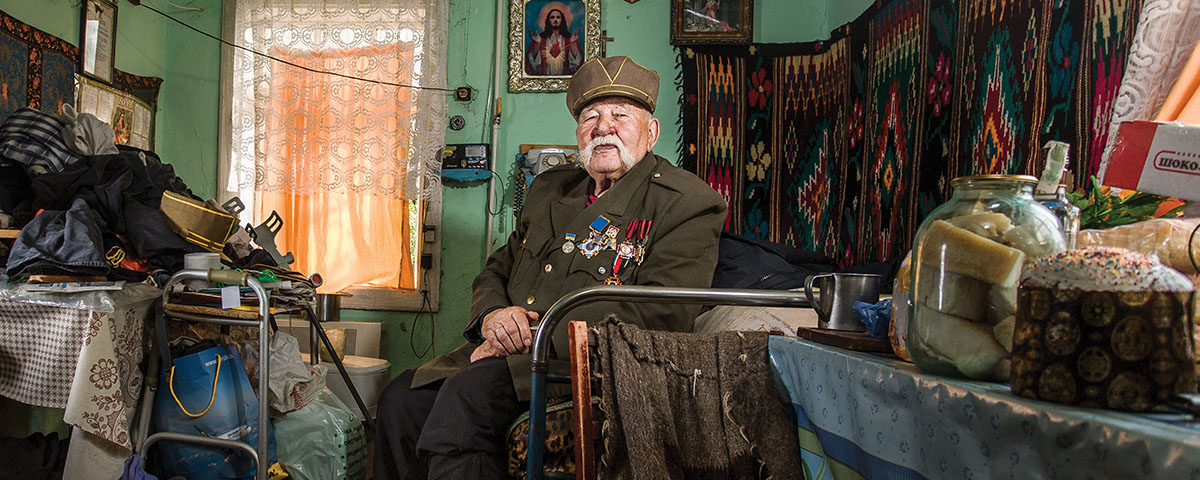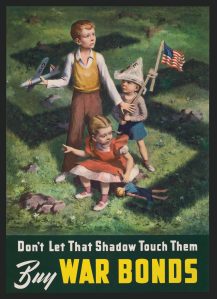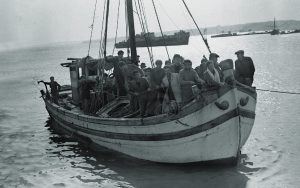My name is Dmytro Verholjak, and I was born in Manyava, in the Ivano-Frankivsk province of Ukraine. When the first Soviets came, my brother told me that he’d rather flee to the West than serve the Russians. Later, I searched for him and with God’s help found him, after 50 years of not seeing him. He was in Australia. Our family had been heavily repressed by the first wave of Soviets, then the second wave almost wiped us out.
During the German occupation in the war, I moved to the Ternopil province and found work on a farm. There was no work where I lived, and when I left home, my mother told me: “The bread you earn with your hands will taste the best.” It was hard to say good-bye to my mother—we loved each other very much. Another thing she told me was that no matter how hard things got, to never take my own life, that it was the biggest sin you could commit. I remembered that so clearly—how she said it—especially later on, when I was in a camp.
The people I worked for on the farm were very nice, civilized. I am very thankful to them for all they did for me, for what they taught me. I was there for four years, and by the time I returned home, the Russians had arrived as so-called liberators—throwing some people in prison and sending others to work in the mines in the east. I saw how they tortured people and humiliated Ukrainians. I felt that there was little for me to do but join the Ukrainian Insurgent Army. I spoke with the partisans in my area and said, “I’m going with you.” They didn’t want me, because I was still a kid. They said, “We have our path, but you have to wait to follow this path, in 20 or 30 years.” I told them I wasn’t leaving them. So one of them shrugged his shoulders and turned around, and I followed them.
The first time I was injured was a year after I went underground. Five bullets in my foot. I was living in the forest with a few others, all young kids. We were busted in the forest by the NKVD, the People’s Commissariat for Internal Affairs. There were five of us, and they fired at us. I got hit then, in my left foot. I wanted to blow myself up with a grenade so they wouldn’t take me alive, but once I realized that I could still walk, I threw the grenade in the direction they were shooting from and ran with the others. They fired more shots, blindly, but didn’t hit anyone else, and we were able to escape. I received three injuries when I was with the insurgents. That first injury has haunted me all my life. A nurse bandaged me once after that incident, and for three or four weeks after that, no one took care of the wound, and it was literally crawling with bugs. It smelled bad enough that people didn’t want to be around me.
One time I was left alone because I couldn’t walk, while two others went off to the village to get some food. I was found by Honta, an older member. He asked why I was all by myself and why no one took care of me. I told him the story of how I got injured and no one attended the wound for a month. He got angry and told me to hang tight, told me that wasn’t the order of things, that he would take care of it and I would never be left alone again like that. Then he left.
Later that night, my guys came back and told me that they’d never leave me again. The next morning, the nurse found us in the forest with another partisan. When she took the bandage off, we saw that the wound was crawling with all kinds of insects. She kept saying, “Don’t worry. If there are bugs, it means there are no germs.” I don’t know what kind of medical school she went to, but at that time, I had no idea what she was saying. Now, I understand she was trying to get me to calm down. As she was cutting my pants with scissors, I was thinking, “These are my only pants—what am I going to do?” The nurse said that when you’re alive, you can get new pants, but if you’re dead, there’ll be no pants for you at all. She stepped away momentarily with the other partisan she’d arrived with, our commander, and started yelling at him: “How could you let this happen? How is it that your soldiers aren’t even trained to change a simple bandage?” Soon after, those in command decided that the nurses would need to train the soldiers to treat each other. I knew a little Latin, so it was easier for me to learn than for others. But for the most part, we didn’t even know simple hygiene at the time. We didn’t have paper or pencils, not to mention medical instruments. And I was learning to do everything with my own wound. After I learned many of the simpler things and could walk, they asked me to travel to one of the insurgent centers in a different village, where there was a wounded person who needed to be taken care of. I learned how to give injections there. I practiced on pillows, of course, before I did it to people. After that, I was sent from one village to another, taking care of the wounded as well as acting as a courier between groups.
Doing that, I learned all the paths through the mountains. I walked everywhere—my legs were so huge that if I sat, my knees would practically be under my chin. I was a big, healthy guy at that time. They gave me a nickname: Oak, like the tree.
Even after the war ended, we carried on fighting against the Soviets. They were as bad as the Germans, if not worse. The NKVD were everywhere, looking for insurgents. They tried to bribe or scare people for information, and many of us were killed or sent away. I was finally arrested in 1952, after being sold out. They tortured and interrogated me, put chemicals in my food. There was an agent with me in my cell who was on a “special diet” while they basically fed me poison.
My health declined there, and eventually, I was sent to a camp in Potma, in Mordovia, for 25 years. There were Poles, Russians, other Ukrainians there. Everybody. They quickly learned that I had been a medic, and I was sent to work in the camp’s hospital. The warden was against this; he was screaming, “Do you know who he is? He’s a nationalist, a Banderivets!” [a follower of Stepan Bandera, a Ukrainian insurgent leader] The nurse told him, “I don’t care who he is. As long as he’s treating others, he’ll be working here.” That was 25 years of my life. They were “correcting” me and didn’t correct anything. When they released me, I was very nervous. My sister arrived to meet me at the gates. It was 1980 when I finally got back to Ukraine. But even free, they didn’t let me do much. I couldn’t work as a doctor or a medic with my record. I had to stay in my village all the time, and I wasn’t allowed to leave my house after 10 p.m. That was my freedom.
But I got a job as a masseur. It was tough to even get that job, but I managed it. I worked as a masseur for 10 years, from 1981 to 1991, when Ukraine finally gained independence. Now, I’m here in Markova, and the people from the village help me a lot. I have a pension.
That is how I started to live freely only after I turned 80. MHQ
Excerpted from Veterans: Faces of World War II (Princeton Architectural Press, 2017), by Sasha Maslov.
Text and photograph © 2017 by Sasha Maslov.
[hr]
This article appears in the Autumn 2017 issue (Vol. 30, No. 1) of MHQ—The Quarterly Journal of Military History with the headline: The Insurgent
Want to have the lavishly illustrated, premium-quality print edition of MHQ delivered directly to you four times a year? Subscribe now at special savings!





